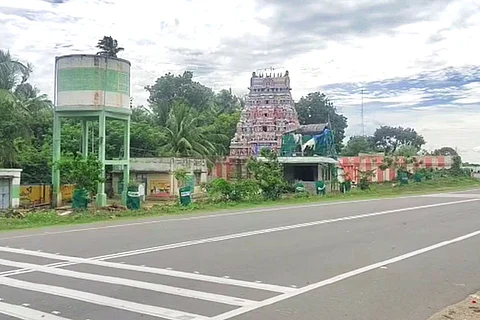

About two weeks ago, on September 5 to be precise, 70-year-old Rajagopal had approached the Sub-Registrar office at Srirangam in Tamil Nadu’s Tiruchirappalli district, to sell his agricultural land spanning 1.2 acres. The farmer, who is also a Dravida Munnetra Kazhagam (DMK) member, was planning to use the money to settle the loan he had taken from his neighbour for his daughter's wedding. At the office, however, he was in for a rude surprise. He was just learning that he would need a no objection certificate (NOC) from the Tamil Nadu Waqf Board to sell his own land, because according to a notification on the Waqf properties located in Trichy taluk, the entirety of his village Thiruchenthurai was the property of the Board.
“I was preparing to sign the papers when the Sub-Registrar informed me that my property cannot be sold. He said it belongs to the Waqf Board, and that I had to get an NOC from their Chennai office to sell the land. The Waqf Board has apparently claimed that the entire village belongs to them,” Rajagopal told TNM. “I just broke down outside the sub-registrar office,” he said.
The development comes in the wake of a circular shot off by the Chief Executive Officer of the Waqf Board to all the Sub-Registrars in Tamil Nadu, informing them not to register the sale, exchange, mortgage or transfer of the properties under the supervisory control of the Board, without obtaining an NOC in a sealed cover from his office. The circular, issued as part of the Waqf Board’s attempt to retrieve its properties across the state, was sent to all of the 12 Sub-Registrar offices in Tiruchirapalli district of Tamil Nadu.
The 245-page circular, dated 11th August 2022, had details of Gazette Notification numbers of Waqf properties, the name of the respective taluk and village, survey numbers, and the extent of the land mentioned in acres and cents. The survey number for one Gazette Notification (number 570) of a Waqf property located in Trichy Taluk, however, mentions the Thiruchenthurai village as ‘whole inam village’, and the extent of land as 389.03 acres — essentially referring to the entire village as its property. The claim triggered panic among the villagers, who launched protests against the Waqf Board’s blanket ban on selling or buying property without obtaining an NOC.
Speaking to TNM, Tamil Nadu Waqf Board Chairman M Abdul Rahman said, “The Waqf Board owns several properties in Tamil Nadu. We are currently in the process of identifying encroached or alienated properties to avoid further misuse of the properties. It is for this purpose that a circular has been sent to all Sub-Registrars in the state, with details of Waqf’s properties and survey numbers.” As far as Thiruchenthurai village is concerned, the records available with the Waqf Board show that 389.03 acres of land in the village belongs to the Waqf, he said. “For most of the properties, the survey number is mentioned. But for some, the records available with us only mention the extent of the land owned, and not the specific details. The survey numbers and other information are available with the Tamil Nadu State Archives. We have requested the department to share those details, based on which we will decide on the next course of action,” he said, adding that property-related transactions have been allowed in Thiruchenthurai village until then.
Meanwhile, this move by the Waqf Board, claiming ownership of the entire Thiruchenthurai village, has snowballed into a major controversy. Rightwing groups and political parties such as the BJP have demanded the arrest of Waqf Board Chief Executive Officer Rafiullah. The Chandrasekhara Swamy Temple in the village, located on the southern banks of the Cauvery river, has become a particular point of contention, with BJP leader H Raja alleging that this was the Board’s attempt to “displace Hindus”.
Reacting to BJP’s allegations, Abdul Rahman said, “We have come across certain documents which show that when philanthropists donate large amounts of lands to Waqf institutions, they sometimes allocate portions of that land for other uses, such as the establishment of temples and ponds, etc. This could have happened in Thiruchenthurai as well. Just because there is a temple on the land, we cannot simply decide that it is not Waqf land. Besides, any land in the name of Waqf can still be used for public utility.”
The web portal of the Waqf Assets Management System of India, managed by the Union Ministry of Minority Affairs, lists 389.03 acres of land at Thiruchenthurai village as Waqf Board property. TNM also verified the Gazette Notification number 570 to confirm that the land had been registered as Waqf property on June 27, 1956. The land has been classified as ‘agricultural land’, and falls under the rural area category. The website also mentions the current status of the property as ‘Information not available’.
As the controversy rages, the Tiruchirappalli district administration held talks with the villagers and Waqf Board authorities to resolve the issue amicably. “An NOC from the Waqf Board is not required to buy or sell land in the village anymore. We have received a revised circular from the Board. Rajagopal has also completed his land transaction without any issues,” District Collector Pradeep Kumar told TNM.
This was confirmed by Abdul Rahman, who pointed out that the Board was awaiting more clarity from the state government on details of the Waqf properties in Thiruchenthurai. “We have allowed the registration of properties in the village as of now. People with vested interests are trying to give a communal colour to every issue. All properties donated to the Waqf Board are available for public use on humanitarian grounds, and not on religious or community grounds. Waqf properties can be used by Hindus too, with proper approval. There is no restriction on this based on religion, community or caste,” he added.